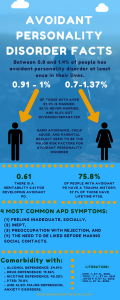Why do people develop avoidant personality disorder?
The fact that less than 5% of people ever develops avoidant personality disorder (avoidant PD or AVPD), raises the question: ‘why does person A develop AVPD and person B not?’ and ‘why does my brother have avoidant PD and I don’t?’. On this page we try to answer these questions by looking at the avoidant personality disorder causes. Some avoidant personality disorder causes may even raise more questions than they provide us with answers. However, combining different scientific articles, this page can answers most of the questions.
One of the avoidant personality disorder causes is heritability, whereas others point in the direction of traumatic experiences during childhood and adolescence. The answer probably is a combination of both: if avoidant PD runs in the family, then it’s more likely that you are predisposed to developing AVPD, but it may only really develop if you experience certain traumatic events, such as child abuse (emotional, physical, sexual) and/or bullying. However, there are also exceptions, which we will discuss in the paragraphs below.
Jump to:
- How to cope with AVPD?
- Living with someone who has AVPD. (coming soon)
- Interesting avoidant PD facts.
- Online counseling for avoidant PD.
- Take me to the homepage.
At Barends Psychology Practice, we offer (online) therapy for avoidant personality disorder. Contact us to schedule a first, free of charge, online session. (Depending on your health insurance, treatment may be reimbursed).
Avoidant personality disorder causes – heritability
According to a study of Coolidge et al. (2001), avoidant personality disorder has a strong genetic component that is present in children. avoidant PD has a heritability of 0.61 [1]. This means that 61% of the avoidant PD traits can be explained by the genetics of the person who has AVPD. The remaining 39% can be explained by environmental influences, such as the way someone has been raised.
A few other studies showed that people with avoidant PD score low on facets of extraversion and high on facets of neuroticism [2],[3] . The low extraversion score indicates that the person with AVPD prefers to avoid social interaction. The high neuroticism score indicates a tendency to experience unpleasant feelings and emotions easily. Approximately 40% of the personality traits stem from inherited traits. This suggests that, even on a component level, there is evidence for a heritability coefficient for avoidant personality disorder. In other words heritability is one of the avoidant personality disorder causes.
(Advertisement. Scroll down for more information.)
Avoidant personality disorder causes – environment
The previous paragraph already explained that 39% of the avoidant PD traits can be explained by environmental influences. But what are these environmental influences? Environmental influences could be upbringing and experiencing traumatic events (think of bullying, abuse). On the avoidant PD facts page you can read all kinds of interesting facts regarding the type of traumatic events. On this page we stick to childhood abuse (sexual, physical, emotional and neglect).
More than 75% of the people with avoidant PD experienced a traumatic event in the past. At least 22% of the people with trauma history experienced childhood sexual abuse/assault [4]. Childhood neglect also increases the chance of developing avoidant PD later in life [4], [5]. These studies, and others, suggest that experiencing childhood abuse (emotionally, sexually, and/or physically) and neglect are avoidant personality disorder causes. And if we take a look at the AVPD symptoms, then we see why this is very likely: people with Avoidant PD usually feel inadequate, inept, and are preoccupied with (possible) rejection. Growing up in a family where the parents aren’t there for you (physically or emotionally), can give children the idea that they are not important, do not matter, are not good enough, and basically feel rejected. Parents are the most important figures for a child. Not being able to rely on their love, attention, and affection can result in withdrawn children.
An interesting question remains: if 61% of the avoidant PD traits can be explained by inheritance, does that mean that the parents of people with AVPD show signs of avoidant PD (or severe social anxiety) themselves? And does that affect the way they raise their children? In short: this is a very interesting question, and difficult to answer. It’s likely that parents who posses avoidant PD traits warn their children of possible rejection a lot or are unable to develop a health attachment with their children. This could result in avoidant PD traits in children as well.
(Advertisement. Scroll down for more information.)
NOTE: experiencing trauma does not mean that you Will develop Avoidant PD. It only means that there is a higher chance of developing avoidant PD. This chance increases significantly if avoidant PD runs in the family and if you have experienced childhood abuse. But even then there is a good chance that you will not develop avoidant PD. Why? Researchers are still trying to find the answer to that question.
Literature used for this page

